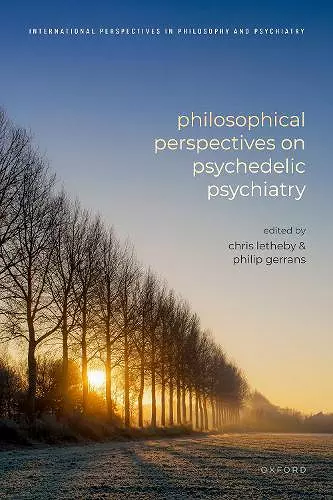Philosophical Perspectives on Psychedelic Psychiatry
Philip Gerrans editor Chris Letheby editor
Format:Paperback
Publisher:Oxford University Press
Published:17th Sep '24
Should be back in stock very soon

A recent wave of research in psychiatry and neuroscience has re-examined the properties of “classic” psychedelic substances - also known as serotonergic hallucinogens - such as psilocybin, LSD, and DMT. Evidence to date suggests that psychedelics can be given safely in controlled conditions, at moderate to high doses, and may have potential as therapeutic agents in the treatment of various addictive and mood disorders. The main mechanism of action appears to be the induction of a dramatically altered state of consciousness, but the details of how psychedelic-assisted psychotherapy works are hotly debated, as are the relations between psychedelic experiences themselves and the neural changes induced by the drugs. Philosophical Perspectives on Psychedelic Psychiatry addresses the fascinating philosophical questions raised by the renewed psychiatric use of psychedelics, with chapters from leading philosophers of mind, science, and psychiatry centred around three main themes. Chapters in the “self and mind” section ask: what can we learn about the self and the mind from psychedelic science? Chapters in the “science and psychiatry” section address methodological, theoretical, and clinical questions concerning how psychedelics can best be studied scientifically and used therapeutically, and how they might work to relieve psychiatric suffering. Finally, chapters in the “ethics and spirituality” section address broader questions about the interpretation of psychedelic experience, its ethical implications, and its possible role(s) in the broader culture.
Clearly written, with an accessible overview of a wealth of recent studies, and while it explicitly undertakes to naturalise the "mystical" elements of psychedelic usage, it is nevertheless refreshing to see the phenomenological data taken seriously. There is much thought provoking material here for those interested in taking a more conventional journey through the doors of perception. * Paul Dicken, Fortean Times *
Letheby's clearly written and well-referenced text ends by offering a set of experiments designed to help readers evaluate the unique challenges presented by psychedelic therapy. * S. Krippner, California Institute of Integral Studies *
Chris Letheby's Philosophy of Psychedelics is not the first philosophical engagement with psychedelics but the most impressive in this budding subfield of the philosophy of mind. * Nicolas Langlitz, The Polyphony *
...we can only hope that there will be a follow up to this interesting book... * Gunnel Minett, The Science of Psychotherapy *
This excellent, well-argued, book is required reading for anyone with interests in philosophy of mind, philosophy of psychology, and philosophy of psychiatry. It presents the first book-length argument for the effectiveness of psychedelic therapy and provides an account of how this effectiveness may be understood from within cognitive neuroscience. Everyone should read this book! * Richard Brown, Humanities Department, LaGuardia Community College, CUNY & M.S. program in Cognitive Neuroscience at the Graduate Center, CUNY *
Philosophy of Psychedelics is really two books in one. It provides an easily understood, scholarly and detailed review of psychedelic science, spanning phenomenology, psychology, neuroscience, and medical therapeutics. But setting this book apart from other recent books in this rapidly emerging field of inquiry, Chris Letheby takes his philosopher's scalpel to addressing intriguing philosophical implications of psychedelic research including the unsettling question of whether the claimed benefits from psychedelic experiences require the induction of delusional beliefs. This very readable volume should be of interest to scientists, philosophers, as well as those simply curious about the recent renaissance in psychedelic science and therapeutics * Roland R. Griffiths, Ph.D., Professor, Departments of Psychiatry and Neuroscience, Johns Hopkins University School of Medicine *
Philosophy of Psychedelics is a terrific, intellectually meticulous study of the nature, meaning, and effects of psychedelic experiences. The discussion ranges over the mind-brain relation, transformative experiences, the ethics of psychedelic therapy, and whether psychedelics help us to see the nature of things as they really are or just produce uplifting and therapeutically positive hallucinations. Chris Letheby is a wise and careful guide to the current state of psychedelic therapy and sets very high standards for philosophers who want to follow him in thinking responsibly about this intriguing area of research. * Owen Flanagan, Duke Professor of Philosophy at Duke University, and the author of How to Do Things with Emotions Princeton 2021 *
ISBN: 9780192898371
Dimensions: 235mm x 158mm x 15mm
Weight: 422g
304 pages